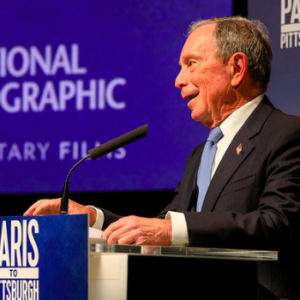When Michael Bloomberg, the founder, CEO and majority owner of Bloomberg News, entered the 2020 presidential race, Bloomberg News made an unprecedented decision.
They decided not to cover, or investigate, Bloomberg or any of his Democratic competitors.
“We will continue our tradition of not investigating Mike (and his family and foundation) and we will extend the same policy to his rivals in the Democratic primaries. We cannot treat Mike’s democratic competitors differently from him,” Editor-in-Chief John Micklethwait said in a memo to reporters last week.
But Bloomberg News will continue to cover President Donald Trump, the candidate Bloomberg would almost certainly face if he wins the Democratic nomination. Supporters of the president, and some advocates for media ethics, are asking: How is that fair?
“With this decision, Mike Bloomberg just put the roughly 2,700 journalists who work for him in a terrible ethical bind,” wrote political commentator Matt Taibbi. “If huge portions of the political landscape are closed off to those reporters by fiat, by definition none of their reporting in any other direction can really be legitimate.”
In response to Bloomberg News’ decision, the Trump campaign said it would ban Bloomberg reporters from covering Trump’s 2020 reelection campaign, citing Bloomberg’s forthcoming political coverage as inherently biased because they will only cover the incumbent Republican and not his Democratic challengers.
“Since they have declared their bias openly, the Trump campaign will no longer credential representatives of Bloomberg News for rallies or other campaign events,” campaign manager Brad Pascarle wrote in a statement.
On Monday, Micklethwait insisted that “the accusation of bias couldn’t be further from the truth.”
“We have covered Donald Trump fairly and in an unbiased way since he became a candidate in 2015 and will continue to do so despite the restrictions imposed by the Trump campaign” he said.
Micklethwait’s case is hurt by the fact that Bloomberg Opinion’s senior executive editor David Shipley has now gone straight over to Bloomberg’s campaign, a sign of the level of loyalty in the editorial department on behalf of their owner.
Kathy Kiely, who served as Bloomberg’s politics news director in Washington until 2016, told the Associated Press that Micklethwait’s new rules “relegate his political writers to stenography journalism… it’s not satisfying for journalists and it’s not satisfying for readers. I think people will go elsewhere for in-depth political coverage.”
Taibbi argues that only covering one political party destroys your credibility as a news organization.
“It amounts to forcing a political directive on the editorial staff,” he said. “Readers and viewers will have no idea what stories were passed over. They won’t know what facts or narratives are being left out of coverage. It’s a joke.”
Aram Sinnreich, chair of communication studies at American University, told InsideSources that given the circumstances, there really was “no right solution for Bloomberg as a news organization.”
“There’s no right answer for them, because the structural situation is so problematic,” he said. “We should not have billionaires controlling the media, because one of the principal jobs of the media is to keep a check on the nefarious power of industry.
“And we should not have people who run media companies running for elected office at the highest federal levels, because the job of the media industry is to keep the highest federal levels in check, Sinnreich said. “So this is problematic already on so many levels, and that’s an insoluble problem. You can’t solve that through adjusting your newsroom policy.”
Instead of declining to cover Bloomberg and the other 2020 Democratic presidential hopefuls, Sinnreich said a better — although not ideal — option would be to cover the primary the way The Washington Post covers Amazon.
“Essentially Amazon coverage by The Washington Post is basically just repurposed Associated Press,” Sinnreich said. “On the one hand, that’s bad, but on the other hand, it’s good, because it means they’re not going to run disinformation and super-friendly coverage [of Amazon]. At least Jeff Bezos so far has had the sense to stay out of politics.”
Putting his news organization in this position, Sinnreich added, is “a tremendously irresponsible thing for a billionaire media owner to do.”
“It’s really, really damaging to the foundational principles of media [and] democracy,” he said.
Taibbi also called Mike Bloomberg’s move selfish.
“Characteristically, he picked the one path that is most contemptible and destructive, retaining ownership of one of the world’s biggest news outlets just to defang it for the duration of his (incidentally moronic) presidential run,” Taibbi wrote. “It’s an awesomely selfish act that shows his contempt for the whole idea of journalism.”
But Sinnreich also slammed Trump for denying Bloomberg reporters credentials to cover his reelection campaign.
“His choices regarding Bloomberg News are completely in keeping with his entire approach to the press during his presidency, which is to treat them as the enemy,” he said. “This strikes me as nothing more than a convenient excuse to continue the policies he’s had in place.”

